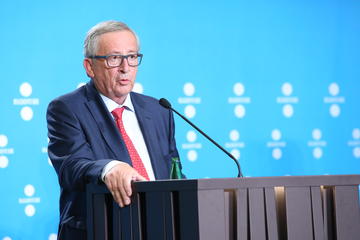
In his speech on the state of the European Union the president of the European Commission Jean-Claude Juncker reaffirmed the importance of credible integration prospects for the Western Balkans
In the speech given last week at the European Parliament, president of the European Commission Jean-Claude Juncker voiced the idea of a one-speed Europe, envisioning a common Minister of Finances (i.e. not just for the Euro area). Proposals included the Eastern enlargement of the Eurozone and the Schengen area and the possibility to add new member countries with the integration of the Western Balkans.
Calling for a more inclusive European Union, Juncker reaffirmed the importance of credible integration prospects for the Western Balkans and the priority of fundamental rights protection.
"If we want more stability for our neighbourhood, we need to maintain credible enlargement prospects for the Western Balkans. [...] Candidate countries need to give maximum priority to the rule of law, justice, and fundamental rights".
Juncker also reaffirmed that there will be no new enlargements during his term, i.e. until 2019, but the letter of intent submitted to president of the European Parliament Antonio Tajani places the integration of Serbia and Montenegro among the objectives to be reached by 2025 .
This approach does not feature significant novelties, but the very fact that the Balkans are mentioned is news. In its brief history – the speech on the state of the European Union (SOTEU) has been given since 2010 – they had only been mentioned once, in 2013, when Barroso mentioned enlargement policy referring to Croatia's membership.
In stark contrast with the opening towards the Western Balkans, Juncker stressed Turkey's dimming prospects for continuing negotiations, in the very light of Ankara's recurring violations of the rule of law, justice, and fundamental rights:
"Turkey has been stepping away from the European Union for some time. Journalists belong in the newsroom, not prison. Their place is where freedom of expression is guaranteed".
The attitude towards Ankara is radically different than in the past, when Turkey was routinely mentioned as a key actor in managing migration flows through the Eastern Mediterranean.
Bulgaria and Romania in the Eurozone?
As regards South-Eastern European countries, Juncker invited to “immediately opening the Schengen space to Bulgaria and Romania” and advocated the same prospect for Croatia “as soon as the country meets all criteria”.
The opening was positively met by the three countries, although with some caution due to the well-known – and readily reaffirmed – opposition by several EU countries, including Germany and the Netherlands. Without the support of these two countries, Juncker's proposal stands no chance, as he certainly knows.

 Juncker opens to the Balkans – but only after him
Juncker opens to the Balkans – but only after him




 Tutti i contenuti disponibili sul sito di Osservatorio Balcani e Caucaso sono distribuiti con licenza
Tutti i contenuti disponibili sul sito di Osservatorio Balcani e Caucaso sono distribuiti con licenza 